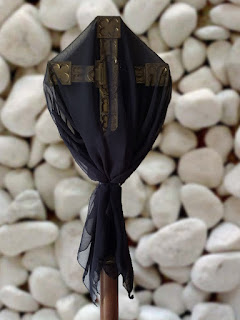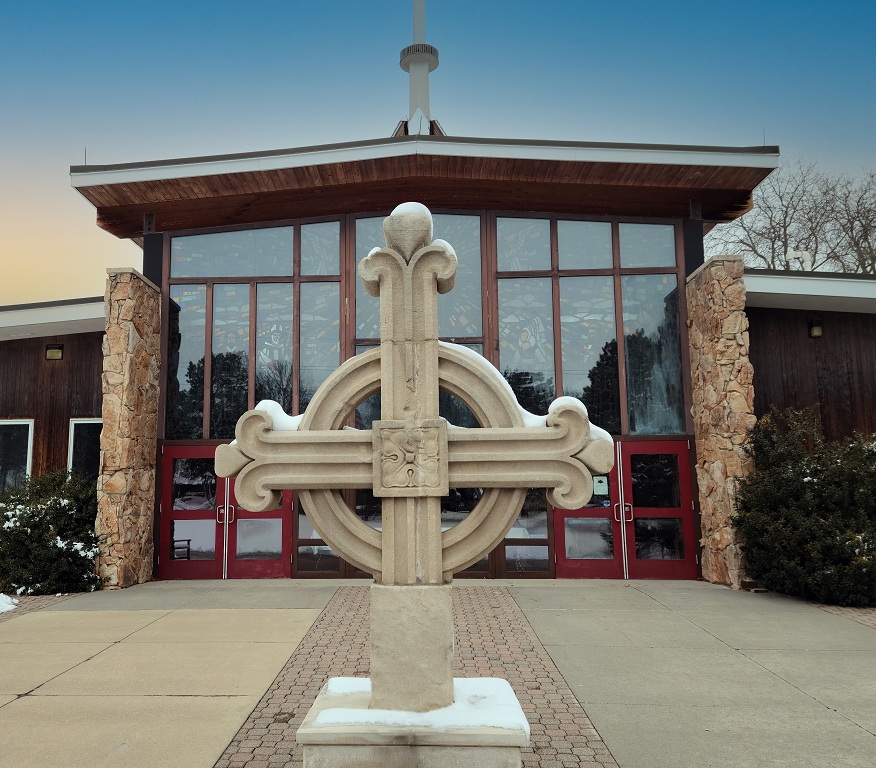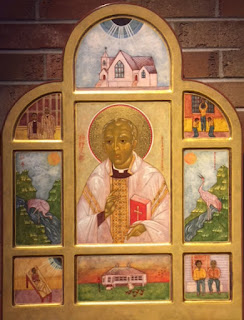Good Friday 2019
This reading from Isaiah, the Suffering Servant hymn, is found in the Good Friday liturgy in the earliest known lectionary, from the 5th century. It draws parallels between Jesus and the annual Day of Atonement ritual in ancient Israel. This was (and still is) the holiest day of the year for Jews, the day when the High Priest would take two goats, sacrificing one on the altar, and putting his hands on the head of the other to lay on it the collective sins of the community, then releasing it into the wilderness, where it would carry off the sins, neither the goat nor the sins to ever be seen again: God had put the sins of the people away, cast them out. If you ask the average American Christian on the street, “Why did Jesus die on the cross?” you’ll most likely hear the answer, “Jesus died to atone for our sins. He did it as a substitute for us, a scapegoat, so that God’s wrath would be appeased.” This kind of view is called substitionary penal atonement – and it’s easy enough to see that if your focus is on that punishment concept, that’s where you end up as your only understanding of the Crucifixion. But how else can we understand the Crucifixion? How can we make sense of such violence? How can we reconcile the horror of the Crucifixion with the idea of a loving God?
One way to make the Crucifixion more multi-dimensional for us is to meditate on what it means that God understands our suffering because God actually suffered. One of the things you learn (the hard way, in my case) is that, in a loving relationship, being able to say “I know, I understand” when the one you love is hurting, is much more comforting than saying, “Let me tell you how to fix that.” Jesus’ suffering on Good Friday shows that God is in solidarity with us, God knows and feels our pain—even the pain of death. Rituals like these that we observe during Holy Week create our on-going identity as the people of God, the children of a loving God. We know so many around us, even many here now, who have experienced extraordinary pain. Part of the message of the Cross is that ours is not a far-off God, unapproachable in majesty, remote and uncaring—Our God enters into pain, suffering, and even death. We know, as Jesus and the Psalmist he quoted know when they say, “My God, My God, why have you forsaken me…”, that suffering isolates and separates us. The suffering of Jesus helps us navigate the waters between the dark hopelessness of despair, which focuses only on past and immediate pain, and the insipid hopefulness of optimism, which focuses only on some distant, idyllic future.
Lament, which we seldom hear in our lectionary readings, speaks to us of endurance in the face of trial. Some have thought that when Jesus cried from Psalm 22 on the cross, he was doing so because he was utterly abandoned by God. But of course the doctrine of the Trinity makes this impossible. Jesus is God, before time and forever, and God cannot be separated from Jesus, nor from the Holy Spirit, in any way. No, Jesus used this Psalm because he knew how it ends: it brings to completion the lament from Isaiah, by saying “But you, O Lord, do not be far away!...from the horns of the wild oxen you have rescued me…For he did not despise or abhor the affliction of the afflicted; he did not hide his face from me, but heard when I cried to him.”
But more than just showing God’s solidarity with us, and giving us an appreciation for the healing power of lament, Jesus’ suffering is a call to us to live and die in solidary with him. Recalling the Passion and reliving it every year in Holy Week is a call for us to stop being numb to suffering—to Jesus’ suffering then, and to the suffering of those around us now—because these are the same suffering. Jesus suffered not because of his own faults—but because of ours. The violence of the Cross was not God’s violence—but ours. Although it is easy, and comforting, to turn our face from those we see each day who are suffering, and to agree as a society that “they” suffer mostly because of laziness or stupidity or lack of responsibility for their own lives, Jesus’ innocent suffering calls us to consider how much we—implicitly and explicitly—individually, as a people, as a community—make “them” be the scapegoat for our own selfish way of life. To worship on Good Friday at the Cross of Jesus Christ is to not turn our eyes from suffering.
Each time I look away from the homeless person in the intersection, from the sick children of hard-working immigrants with no insurance, from those who live in the hopeless grind of poverty…I look away from Jesus…I reject Jesus…I hide my face from him, just as surely as if I were there at Calvary long ago. Jesus’ public suffering teaches us that there are no easy scapegoats. There is no casual sending away of innocent victims to carry off our sin—our sin has real, tragic, consequence. Jesus entered into our world, bearing the full weight of humanity and facing our sin head-on, sustaining the world on his arms of love and mercy. He calls us not to turn our faces from him—not to turn our face from his, then, nor from his face today. In the light of the issues like climate change, pollution, energy and natural resource use, extremes in distribution of wealth and healthcare, racism, and classism—in light of these and so much else—how many, today are silent, suffering servants, wounded for our transgressions, bearing our griefs, carrying the diseases of our culture of tribalism, greed, and consumerism, for us. We may not use Roman crosses to do our dirty work of death and destruction, but perhaps it would be more honest if we did. So, on Good Friday, part of what we do is confess: All we like sheep have gone astray; we have all turned to our own way. The rites of Holy Week—the foot washing, the weeping before the cross, the drama of Easter Vigil—are nothing but empty rituals if they don’t challenge us to make our own lives be lives of suffering servanthood, like Jesus’ life, lives of redemption and reconciliation for all of God’s creation.
Still, though, we’re left with that uncomfortable question of atonement. The sin of humanity was so great that only God could make up for it, they say. It took an infinite amount of good being sacrificed to tip the scales in our favor so God could forgive us, they say. God had to give the devil his due and pay our ransom, they say. But I offer this today: God didn’t sacrifice Jesus to take out God’s rage and anger on Jesus rather than on us—The Lamb of God is not offered to God by humanity as our substitute, but the Lamb of God is God’s own self offered to us, reconciling us and the world to God, exposing our idolatrous system that promises order, safety, peace, and protection through violence. The Crucifixion should reorient us from a theology of justice and atonement and payment, to a theology of sacrificial love.
If we insist that God’s economy is like ours, then the crucifixion must be transactional. We racked up a big debt of sin that we can’t pay off. Jesus is the only one who can provide a payment big enough. But God’s economy is not the same as ours, and it’s not transactional. God loves us—God has loved us from the beginning, God loves us now, and God will always love us, forever. What God wants is for us—for all of creation—to be in a loving relationship back with God (and with each other). Christ’s life, death and resurrection are an affirmation of God’s radical grace towards us—the ultimate message from God, face-to-face, in person, that cannot possibly be misconstrued: power, force, coercion, and violence are not the ways of our loving God. God, in Jesus, acts in love and forgiveness, even to those who killed him on the cross—even to us—and shows that there is ultimate victory in God’s love, even over death. On Good Friday, the world is transformed, and us with it; God’s way is the way of love for your enemies, the way of praying for those who persecute you—God showed us that, once and for all, in Jesus, on the Cross. The ancient story that began with selfish disobedience in the Garden of Eden, continued with the brutal murder of one brother by another, and then, on and on, with tribe battling tribe, with division and blame and hatred and greed and fear, came to its logical and final conclusion—we finally succeeded not just in killing each other, but even in killing God. God didn’t require Jesus’ death—we did. But there is another side to that story: In the Garden, when Adam and Eve had turned from God and were hiding, God came searching them out; the mark of Cain was given to him not to mark him as condemned, but to protect him, showing that God’s love was still with him. In all of the history of Israel, God was faithful, God’s love never-failing, even when Israel was unfaithful. So it is, finally, absolutely, with the cross—in the Cross—on the Cross, Jesus doesn’t save us from God—Jesus shows us God. The cross shows us a God of love and forgiveness, a God whose nature is love in such fullness that Love is even willing to sacrifice itself to prove to us what we refuse to understand. And, on Easter Day, Love shows us a God of such power that even death can’t win—only Love wins. That’s the final message of the cross, the message we’ll hear and sing with two dozen Alleluias! on Easter Day—only love wins.
There is a poem by English priest W. H. Vanstone, Love’s Endeavor, Love’s Expense, that is set to music in our hymnal (H-585), that says this better than I ever can in the poor words of my sermon:
Morning glory, starlit sky,
soaring music, scholar’s truth,
flight of swallows, autumn leaves,
memory’s treasure, grace of youth:
Open are the gifts of God,
gifts of love to mind and sense;
hidden is love’s agony,
love’s endeavor, love’s expense.
Love that gives, gives ever more,
gives with zeal, with eager hands,
spares not, keeps not, all outpours,
ventures all its all expends.
Drained is love in making full,
bound in setting others free,
poor in making many rich,
weak in giving power to be.
Therefore he who shows us God
helpless hangs upon the tree;
and the nails and crown of thorns
tell of what God’s love must be.
Here is God: no monarch he,
throned in easy state to reign;
here is God, whose arms of love
aching, spent, the world sustain.
On the Cross, Jesus doesn’t save us from God—Jesus shows us God.




Comments
Post a Comment